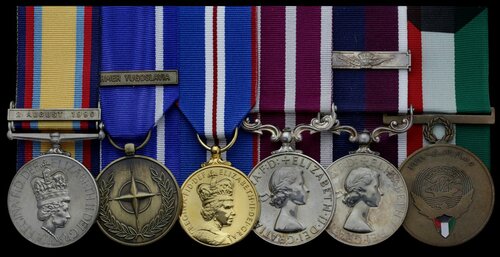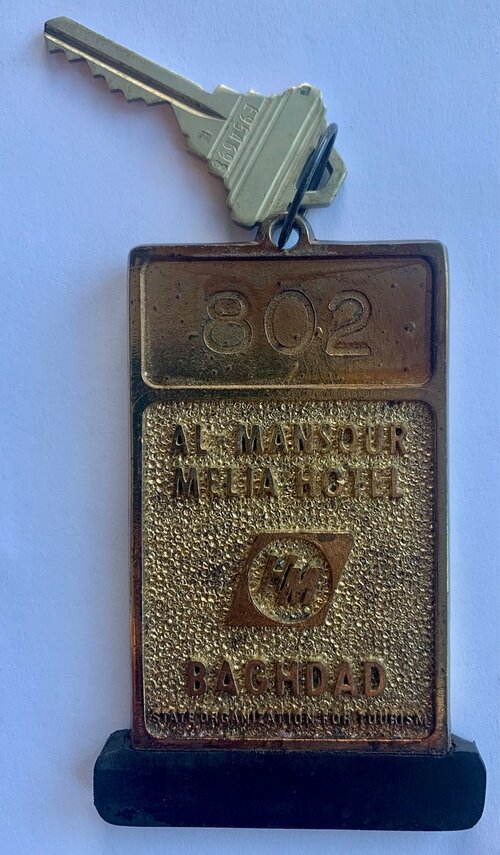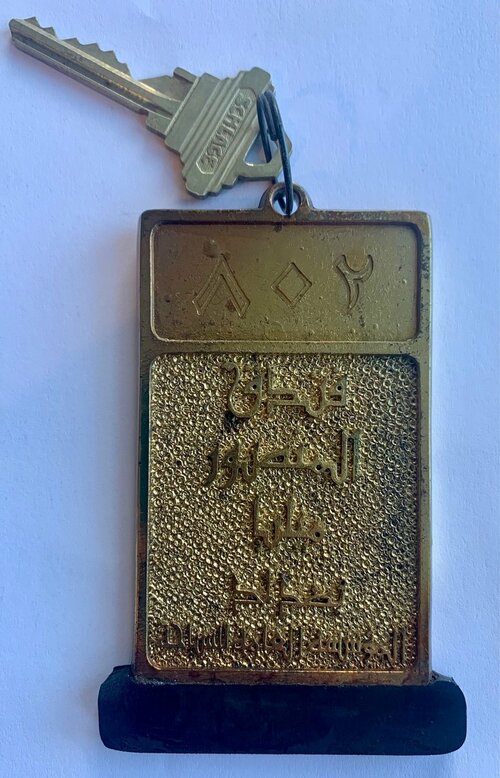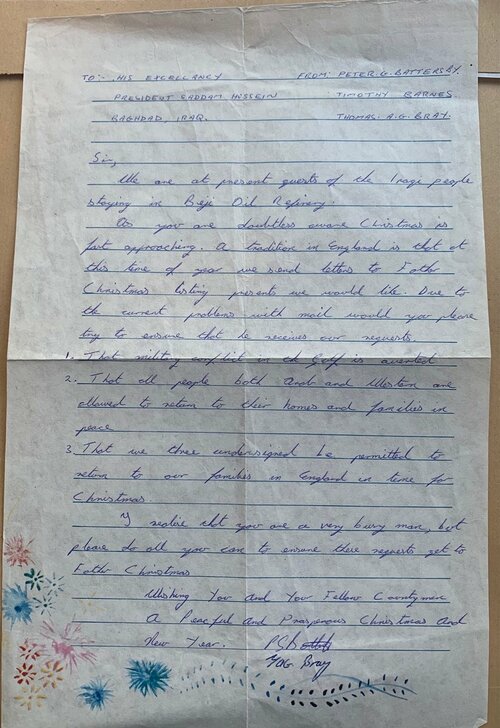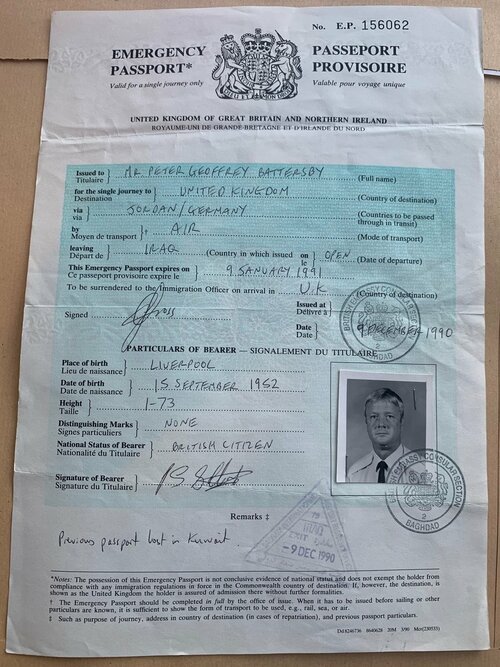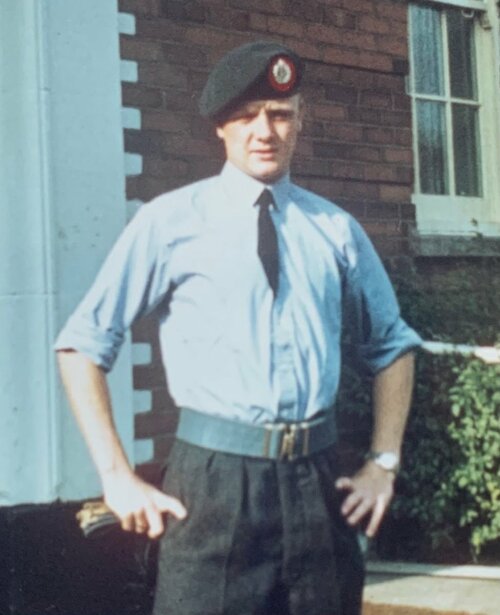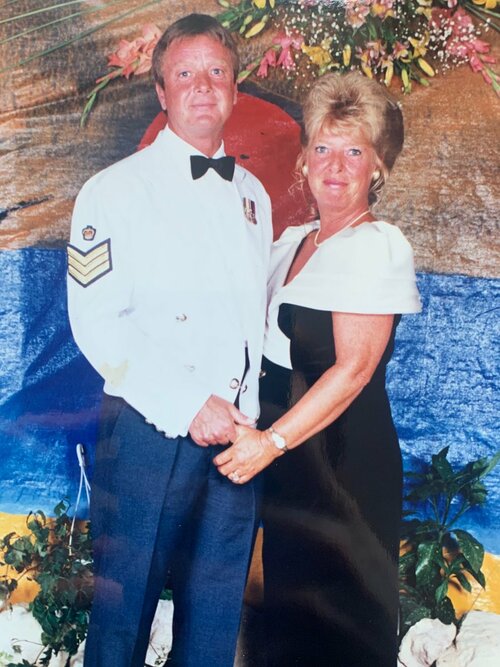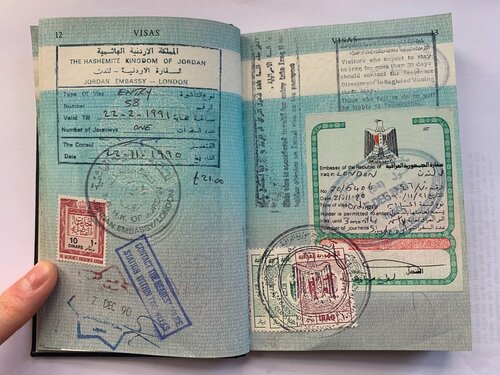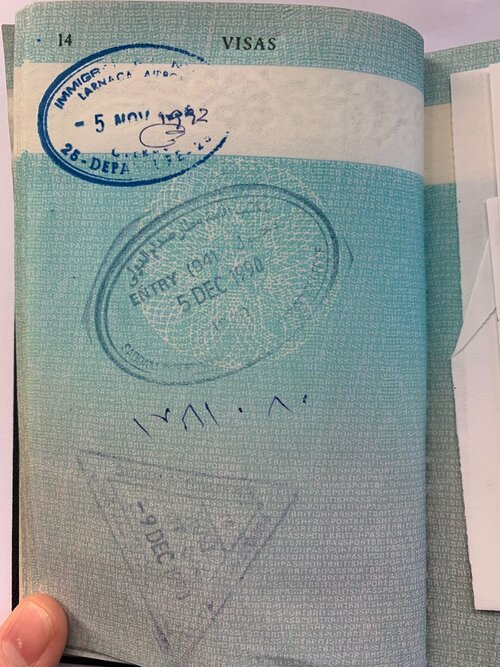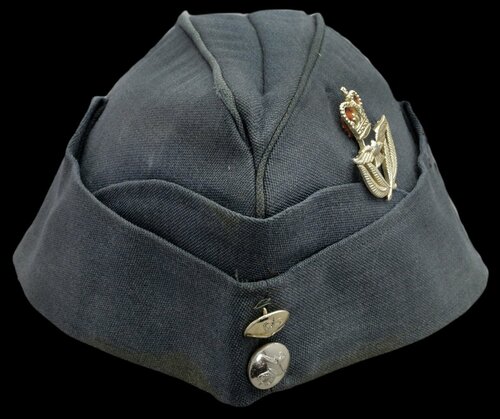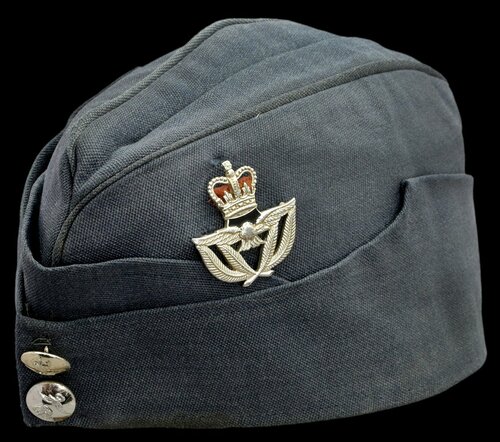Auction: 21001 - Orders, Decorations and Medals (conducted behind closed doors)
Lot: 423
(x) The rare and well-documented 2007 Royal Air Force M.S.M. and First Gulf War 1990-91 Medal with ‘2 August 1990’ clasp group of six awarded to Warrant Officer P. G. 'Blue' Battersby, Royal Air Force, a member of the British Liaison Team in Kuwait, who, together with his wife, was taken hostage following the invasion and held as part of Saddam Hussein’s “Human Shield”
Battersby was held at the famous Mansour Melia hotel besides a number of oil installations and was far from content as a captive, he ensured to subvert his captives and get information to the outside world, despite being beaten and expecting to be executed at any time
Gulf 1990-91, 1 clasp, 2 August 1990 (FS P G Battersby (D8010710) RAF), officially re-impressed naming; N.A.T.O. Medal, 1 clasp, Former Yugoslavia; Jubilee 2002; Royal Air Force Meritorious Service Medal, E.II.R. (WO P G Battersby (D8010710) RAF); Royal Air Force L.S. & G.C., with Second Award Bar, E.II.R. (Chf Tech P G Battersby (D8010710) RAF R); Kuwait, Emirate, Liberation Medal, good very fine and rare (6)
M.S.M. London Gazette 16 January 2007.
According to figures given in British Battles and Medals just 38 clasps dated ‘2 August 1990’ were issued, this being just the third traced on the market and the first to the Royal Air Force to appear for sale.
Peter Geoffrey Battersby - or 'Blue' to his friends and comrades - was born in North Liverpool on 15 September 1952 and joined the Royal Air Force as an Apprentice on 29 October 1969. His own account offers perhaps the best account:
'I joined the RAF in Oct 1969 and completed a 2 year Armament Apprentiship at RAF Halton. I was posted to Cottesmore and worked on both Vulcans and Canberras. Married Gilly Jan 1973 at Oakham Register Office...
May 1988 Secondment to Kuwait Liaison Team (later known as British Liaison Team). Notional tour of 2 years 2 months with a further 7 month extension if approved by the Kuwait Air Force. We lived initially at Ahmadi and after approx. 6 months moved into the camp at Fahaheel known as IBI. Gated and guarded community for British Forces personnel.
End July 1990, trouble was brewing between Iraq and Kuwait over oil rights etc. We noticed on 1st Aug that the gold souks and money change shops in Fahaheel had closed. As I was based at KAF HQ, I worked half a day on Thursday's with Friday off (their Holy Day). I was getting dressed for work early on 2nd Aug and could hear low flying planes overhead, very unusual. There was a knock on our door and the RSM, told me that the Iraqi's had invaded and no one was to go to work. We then started to head the bangs and explosions from nearby. We had a message from our Commander relaying an Embassy message that all would be OK and the Iraqi's would stop at Muttla Ridge and not come any further into Kuwait. We loaded our cars with vital supplies and made ready to leave in good order should we be told to; we were after all only 40mins from the Saudi border.
3rd Aug, the Iraqi's killed our camp guards, and locked us in (28 families approx.). They informed us that they would ensure our safety and all would be fine. To try and allow the childrens fears (many were out visiting their parents during school holidays), Gilly and I organised a BBQ in our garden for some of the families (we by now had 3 families staying with us as we felt security in numbers). We had just fired up the charcoal when our fence (rattan) was smashed down by about 7 Iraqi's with rifles and RPGs pointed at us ordered the men to follow them, we had no choice. So, wearing flip flops, shorts and vests we (approx 28) were taken on a bus to Ahmadi Police Station...
After several hours we were told that we would be taken to Iraq...Some 12 hours into our trip we were driven to a Military Air Base in Iraq and loaded onto an Iljuschin aircraft flown low level to Baghdad. From there we were taken to the Mansour Melia and I was locked in Room 802 (see room key and fob which I kept).
For the first few days we were interviewed by security people but we all had cover stories that separated us from the Military. I was an ejection seat specialist working on a contract from the British Embassy.'
Having had no contact with the world, the captives were taken to see their wives, but the ordeal was far from over. Having understood to be at the Mosul Oil Installation with three other families, and having been together for three weeks, Saddam Hussein made the decision to release the wives. The morning after they left, Battersby and his three comrades were loaded into a Jeep and returned to Beji. Later the number of captives swelled to 18, with an American, three French and ten Japanese joining them. Battersby again:
'After about a week, we were allowed to walk outside, so long as we were in sight of the guards. There were Polish oil workers who risked their lives to talk to us asking how many etc. I managed to write all our named on a small piece of paper, stuff it into a match box and throw it towards them on one of our walks. I asked if the paper could be handed somehow to an Embassy in Iraq, I still can't quite believe it, but they did...
We had a World Service Radio hidden in the toilet cistern and used to take turns listening, Saddam offered wives the chance to visit his "guests" should they wish to. About a week later, one of the guards told me I was being driven away, we all thought I was to be shot, so I said my goodbyes and left. I was driven to the Mansour Melia.
When we got there, and drove into the arrival area, suddenly my 'minder' punched me and threw me onto the floor of the car and knelt on me. The car sped around the back of the hotel. I thought "this it it, I'm a gonner". After about 5 mins he got off me and checked that apart from the sore cheek I was OK, got me out of the car and we entered via the service entrance. It turned out that we had arrived at the same time as Ted Heath and his entourage and I was not to be seen.'
Expecting a trap, Battersby was re-united with Gilly who had come into Iraq via Jordan and had herself been arranging to meet Tariq Aziz and Saddam to try to negotiate their release.'
By this time, Battersby had been captive for some three months. One cannot imagine the mental strain and constant expectation of torture or execution. His coolness throughout is quite remarkable. Taken back to Beji, he was assisted by an American who provided medical supplies and a case of whisky to help them pull through. On 6 December the British captives were again driven to the Melia and reunited with some 17 other wives, all organised by Gilly, together with aid for the Red Crescent, which earned her the 'Dove of Peace'.
The whole party were finally released on 10 December, having endured over four months at the hands of Saddam Hussein and his men.
Battersby was awarded his L.S. & G.C. on 15 March 1985 and he explains the reason for the Replacement sold with this group:
'You will note my L.S. & G.C. is a replacement. This is because, for some reason I took the Medal with me to Kuwait and after we were taken, Gilly hid both my Medal and my RAF ID in our freezer. Unfortunately, the Iraqi soldiers were not that well fed and decided to raid the houses for food. As well as taking our best fillet steaks, they also took my Medal and ID; hence the Replacement!'
Promoted Warrant Officer in 1996, Battersby was posted to RAF Wittering, working on the Harriers and also passing the EOD Bomb Disposal course. Whilst in Leicestershire he was appointed a Justice of the Peace and is understood to have been the first serving Serviceman to be allowed to sit as a Magistrate. He retired in September 2007.
Sold together with an important original archive comprising:
(i)
The named boxes of issue for his Medals.
(ii)
His two identity tags.
(iii)
The key to Room No. 802 of the Al-Mansour Melia Hotel, Badghdad, the room in which he was held.
(iv)
His typed account of his career and its details.
(v)
Copied Service Record, together with a run of his Staff Reports.
(vi)
His letter written to His Excellency President Saddam Hussein, from Battersby, Timothy Barnes and Thomas A. G. Bray.
(vii)
The statement by Mrs Battersby on the events of late 1990.
(viii)
An archive of letters from the MOD to Mrs Battersby related to the capture of her husband, developments with other captives and letters forwarded to her relating the events as they unfold - an unpublished and unqiue insight.
(ix)
His Emergency Passport, dated 9 December 1990 and permitting a single journey from Iraq to the United Kingdom, noting 'previous Passport lost in Kuwait' with a two-month validity.
(x)
Items related to the British Liaison Team, including Liaison Times and Information Pamplet.
(xi)
His Warrant Officer's commission, letter of congratulation and photographs related.
(xii)
A selection of original Certificates of Qualification, 8B1 Advanced EOD Certificate and admittance Certificate for the Honourable Company of Disposaleers, promotion, Service Records and further material, including photographs.
(xiii)
The Passport in the name of Mrs G Battersby, including the period of interest, with a plethora of related Visa Stamps for Iraq and Jordan in the period, together with her 'Dove of Peace' pin Badge.
Subject to 5% tax on Hammer Price in addition to 20% VAT on Buyer’s Premium. For more information please view Terms and Conditions for Buyers.
Sold for
£7,000
Starting price
£2400

